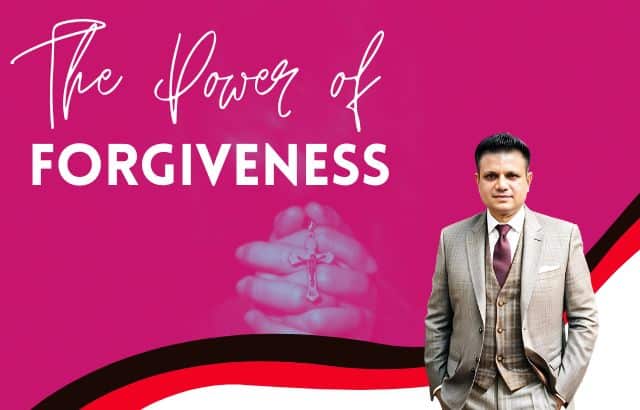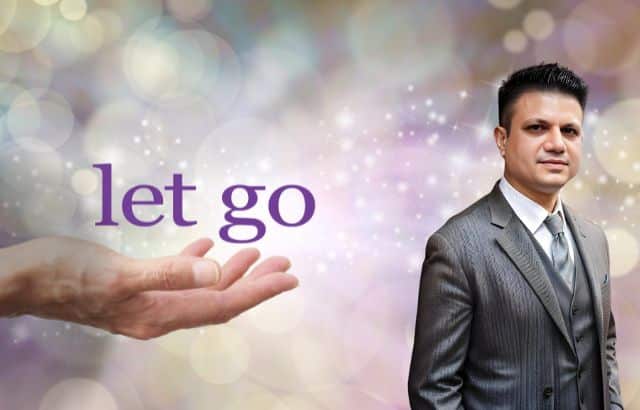By Hirav Shah, The Game Changer, Prolific Business Enhancement Leader
In both personal and professional life, we often face situations that test our ability to forgive. Whether it’s a betrayal at work, a disagreement with a colleague, or a personal conflict, holding onto anger or resentment can have far-reaching consequences on our emotional and physical well-being. As Hirav Shah, The Game Changer and business strategist, often emphasizes, forgiveness isn’t just a moral act—it’s a strategic tool for unlocking greater success, mental clarity, and emotional freedom.
While the act of forgiveness may feel challenging, it is essential to recognize that it is not about condoning the wrongdoing but about freeing yourself from the burden of negative emotions. Forgiveness is one of the most powerful ways to reclaim control over your life and restore inner peace. As leaders and professionals, learning how to forgive can lead to better decision-making, improved relationships, and the ability to navigate obstacles with strength and resilience.
In this article, we will explore quotes on forgiveness that not only capture its essence but also provide practical strategies for embracing it. You’ll discover how forgiveness can serve as a catalyst for personal growth, business innovation, and enhanced emotional well-being. Let’s dive into the transformative journey of forgiveness and learn how to leverage it for greater success in all areas of life.
Here are a few proven strategies to help you practice forgiveness, even when it feels like the hardest thing to do.
Table of Contents
1. Think From Their Perspective: Walk a Mile in Their Shoes
It’s easy to hold grudges when you feel wronged. However, try stepping into the shoes of the person who hurt you. Why did they act this way? What might have influenced their actions? Sometimes, understanding their perspective can lead to empathy.
For example, as a business strategist, I have often had to make decisions that some employees or partners may have found difficult or unfair. When they confront me with their feelings, I must listen and understand their perspective, even if I disagree. The same logic applies to personal grievances. Understanding that there might be underlying factors affecting someone’s actions helps you distance the hurt from the person.
Example:
You might be angry at a colleague for taking credit for your idea. But what if their behavior was driven by a fear of not being seen as valuable in the company? This understanding doesn’t make their actions right, but it can help you approach the situation with more compassion and less anger.
2. Forgiveness Is Not a Quick Fix
Forgiving someone doesn’t immediately solve all your problems. The misconception is that forgiving means everything will be okay, that there will be an instant emotional reset. The truth is, forgiveness is a process, not a quick fix. It takes time, and it doesn’t always result in an immediate emotional shift. But here’s the thing: forgiveness frees you.
Think of forgiveness like a business investment. The return doesn’t come instantly. It might take time to see the benefits, but over the long term, it will yield incredible rewards—better relationships, improved mental clarity, and emotional freedom.
Example:
In a business context, an executive might let go of an employee who has repeatedly underperformed. The decision to forgive might not instantly improve the employee’s performance, but it might remove the toxic atmosphere that was affecting the entire team. Forgiving frees the decision-maker from lingering resentment, allowing them to move forward in a more positive light.
3. Acknowledge Your Feelings
Acknowledging your feelings is the first step to healing. You can’t forgive until you’re honest with yourself about the hurt, frustration, or anger that has built up. Pretending these feelings don’t exist or trying to ignore them only gives them more power. Recognize how you feel, and be honest with yourself.
Example:
If you feel betrayed by a colleague’s actions, don’t suppress the feeling. Acknowledge that you’re upset. Once you admit this, the next step is to ask yourself how these feelings have influenced your actions at work. Are you avoiding them? Are you holding a grudge? Acknowledging your emotions allows you to regain control of your behavior.
4. Do It, But Not Alone
You’re not alone in your struggle. Everyone has faced a situation where they’ve been wronged. It can be incredibly cathartic to talk to someone you trust about your feelings, whether it’s a friend, a mentor, or a business colleague. When you vocalize your grievances, you gain a new perspective on your emotions.
Example:
A business strategist I know once confided in me about a significant betrayal by a close business partner. Initially, he was too upset to think clearly. But once he shared his thoughts with a trusted advisor, he gained valuable insight and was able to move past the incident, ultimately strengthening his business relationships.
5. Forgive Verbally
Forgiving isn’t just a mental process—it’s an action. And sometimes, taking that action means saying it out loud. “I forgive you.” It might feel awkward or even insincere at first, but verbalizing your forgiveness is an empowering act. It makes forgiveness real—not just a thought, but a commitment.
Example:
In a professional setting, a manager may have to forgive an employee who failed to deliver on a major project. Saying, “I forgive you,” aloud can clear the air and help reset the relationship. While it won’t erase the mistake, it can open the door to future collaboration and growth.
Final Thoughts on Forgiveness
Forgiveness is about letting go. It’s about releasing anger, resentment, and pain, so you can move forward in a more positive and productive manner. It means accepting that life isn’t always fair and that people will sometimes wrong us—intentionally or unintentionally. But instead of focusing on the person, forgiveness helps you focus on the situation, learning from it, and growing beyond it.
As a business strategist, I’ve seen how forgiveness can transform not only an individual’s mindset but an entire organization’s culture. It’s about acceptance, grace, and compassion, not just for others but for yourself.
It’s one of the most powerful gifts you can give yourself: the freedom to let go and rise above your challenges.
FAQs:
1. Can forgiveness improve my professional performance?
Absolutely. Forgiveness helps to clear emotional baggage, improving focus, decision-making, and leadership. When you’re not weighed down by resentment, you can approach challenges with a clear mind and a positive outlook.
2. How can I forgive someone who hasn’t apologized?
Forgiveness isn’t about waiting for an apology—it’s about freeing yourself from the emotional chains of resentment. It’s a personal decision to move forward, regardless of the other person’s actions.
3. What if I forgive, but the person doesn’t change?
Forgiveness isn’t about changing the other person. It’s about changing your own mindset. Once you forgive, you’ll be better equipped to handle similar situations in the future with more grace and less emotional reaction.
4. Is there a way to forgive without forgetting?
Yes. Forgiving someone doesn’t mean you forget what happened. It means you no longer let that event control your emotions or behavior. Forgiveness allows you to move forward while still being aware of past lessons.
Remember: Forgiveness isn’t just for others. It’s a vital part of your own growth and well-being. And as you continue to practice it, both in your personal and professional life, you’ll unlock a new level of freedom, peace, and success.
As a business leader, forgiveness is one of the most strategic tools you can use to become a true game changer in your field.
— Hirav Shah, The Game Changer
Insights, Strategies, and Execution by Hirav Shah, The Game Changer
1. “Forgiveness is the key that unlocks the door to emotional freedom.”
Explanation:
Forgiveness is not just a passive action—it actively frees you from the emotional weight of grudges, resentment, and anger. By forgiving, you release the grip these negative emotions have on your life.
Strategy:
Embrace forgiveness as a powerful tool to enhance emotional clarity. Instead of allowing anger to cloud your judgment, use it as a path to clarity and mental peace.
Execution:
Identify the emotions that are holding you back and commit to letting them go. You don’t need to forget, but allow yourself to stop being weighed down by past wrongs.
2. “Forgiving doesn’t mean you condone the wrongdoing; it means you choose to move forward.”
Explanation:
Forgiveness is not about justifying or excusing the actions of others. It’s about choosing to release the hold that the past has on you, and moving towards a brighter future.
Strategy:
Use forgiveness to create a mental boundary between the person and the wrong they’ve committed. This allows you to separate their behavior from your emotional well-being.
Execution:
When you feel the urge to hold a grudge, remind yourself that forgiveness is not about accepting the wrong; it’s about choosing peace over pain.
3. “Forgiveness is not an act of weakness, but of strength.”
Explanation:
It takes immense strength to forgive. The act of forgiveness requires letting go of hurt and choosing to let go of the emotional baggage that can weigh you down.
Strategy:
Recognize that choosing to forgive is a testament to your strength. It empowers you to move forward with grace, rather than allowing past hurts to define your future.
Execution:
Practice small acts of forgiveness daily—whether in your personal or professional life. Each time you choose to forgive, you’re strengthening your emotional resilience.
4. “To forgive is to set yourself free, not the other person.”
Explanation:
Forgiveness primarily benefits you. It is about liberating yourself from the mental and emotional chains of resentment that limit your personal and professional potential.
Strategy:
Shift your mindset by realizing that forgiveness is an act of self-care. It’s about restoring your emotional balance, not necessarily about reconciling with the other person.
Execution:
When you’re ready to forgive, take a few moments to reflect on how holding onto anger has impacted your well-being. Use this as motivation to forgive, allowing yourself to heal.
5. “Forgiveness allows you to focus on the future, not be anchored in the past.”
Explanation:
Forgiveness frees up your mental space, allowing you to focus on new opportunities rather than being stuck in past grievances. It’s about living in the present and building your future.
Strategy:
Reframe your perspective—view forgiveness as an investment in your future success, rather than a concession to the person who wronged you.
Execution:
Start by releasing one small grudge or hurt. Notice how letting go helps you focus on what lies ahead. Gradually, you’ll create a habit of moving forward, not backwards.
These quotes are designed to inspire and reinforce the power of forgiveness, not only for emotional well-being but for growth, leadership, and success.


















